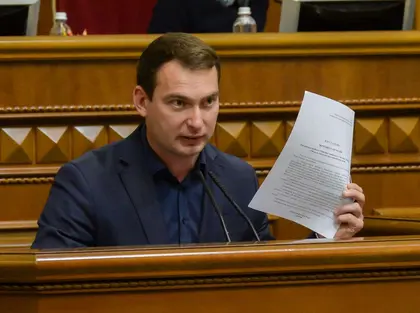Ukrainian authorities are planning to reform its two most problematic government agencies - according to Yaroslav Zheleznyak of the Holos (Voice) opposition faction in the Ukrainian Parliament. The lawmaker is currently heading a commission whose mandate is to investigate possible violations of Ukrainian legislation by government officials.
Last January, in an interview with Kyiv Post, he named the three most corrupt government entities comprising Customs, the National Agency for the Investigation and Management of Assets Derived from Corruption and Other Crimes (ARMA), and the Economic Security Bureau (BES).
JOIN US ON TELEGRAM
Follow our coverage of the war on the @Kyivpost_official.
In Ukraine, the Verkhovna Rada (Ukraine’s Parliament) has the power to create and/or reform government agencies by approving applicable legislation. In a new exclusive commentary for Kyiv Post, lawmaker Zheleznyak explained:
“Yesterday (April 4), at a meeting of the Parliament Commission, we reviewed cases of agency sales of seized ammonia and potassium. Our inspection revealed that ARMA did not pay VAT and sold the ammonia and potassium below market value,” he said.
Ukraine is seizing Russian and Belarusian assets obtained through corruption or other illegal means that are valued at billions of dollars after they were transferred to ARMA.
The lawmaker said that ARMA must either find good managers for this property or sell it to benefit Ukrainian state coffers. Both tasks are facing significant problems. The opaque sale of seized assets and the auction of property at low prices are the main complaints against the agency.

Ukrainian Deputy Minister Detained for Massive Bribe
At the end of February, the parliamentary head of the Servant of the People political party, David Arakhamia, suggested that ARMA should be closed down and the seized assets should be transferred to the State Property Fund.
Zheleznyak reported to Kyiv Post that lawmakers are considering two options:
· First - require ARMA to sell confiscated goods at Prozorro sales electronic auctions, or
· Second - terminate the existence of ARMA.
“I think the option of agency's termination is more effective,” Zeleznyak said.
A month ago, the Parliamentary Committee on Finance, Taxation, and Customs Policy found the BES's work unsatisfactory. After that, MPs registered a draft law that provides for a complete reboot of the BES, including the recall election for its leader.
In 20022, according to the Parliamentary Committee, the BES had 664 criminal proceedings underway, of which only 15 were sent to court - 12 of which resulted in convictions.
The amount of compensation for losses to the budget is many times less than the BES claims. Anyone can check this - the Bureau is required to report its work to the Prosecutor General's Office. According to this report, for 2022, the Bureau reimbursed the state budget only 33.27 million hryvnias of the established amount of 154 million losses.
Since the Parliament started its criticism, BES's performance has significantly improved. Thus, in the first two months of this year alone, the BES's work helped the state budget receive twice as much money as in 2022 - 66.69 million hryvnias.
The Parliament created the BES two years ago to reboot the system of investigating economic crimes and now wants to re-reboot the work of the Bureau itself, which has been in operation for only a year and a half. However, lawmakers are among many wanting to start the BES's history from scratch.
According to media reports from the National Bank, the relevant clause was included in the memorandum of cooperation between Ukraine and the IMF. It is confirmed to Kyiv Post by lawmaker Zheleznyak:
“Thus, reforming the BES is a point of cooperation with the IMF, and this is reflected in the particular draft law, which includes a change of BES management,” he said.
Importantly: the receipt of about $15.6 billion in loans from the Fund and another $40 billion in related financing depends on the BES reboot.
You can also highlight the text and press Ctrl + Enter






